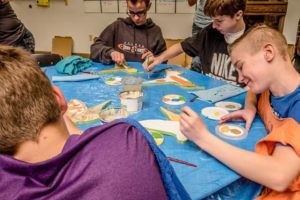Local Food to the Rescue
- salmonvalleystewardship
- Mar 25, 2016
- 3 min read
By Marii Stratter, SVS Americorps VISTA volunteer
Joel Salatin is a food activist and outspoken critic of our industrial food system, particularly vocal about government food regulations. He sees a resilient local food system as the “ultimate democratization and freedom answer to the current heavy-handed, one-size-fits-all approach of the industry-driven food regulation system from the federal level.”
First and foremost, Salatin is a third generation family farmer in Virginia’s Shenandoah Valley.
How exactly does a farmer become a famous speaker? It started when he refused to ship a steak from Virginia to New York – to food columnist Michael Pollan. Pollan, first angry, became intrigued and paid Salatin a visit. The rest is history. Joel became a key figure in Michael Pollan’s bestseller “Omnivore’s Dilemma” and in the documentary “Food Inc.”
Many of us have come to realize the way our global food system works is simply put, abnormal. It is far from effective or cost-effective. The local food movement is a counter-reaction to the broken industrial food system. Keeping it local is about returning to our roots and exploring the possibilities of a local, circular food system.
An advocate for a more sustainable food system, currently helping to strengthen the food network in Idaho’s Salmon Valley, I decided to go see Salatin in Ketchum, secretly hoping he would inject me with a good dose of inspiration. Which he certainly did.
His talk “Local Food To The Rescue” made 4 basic points.
Our profound ignorance of our dependence on the ecological umbilical. At every waking moment, there is “drama” happening on the microscopic level, something he calls an “underground nutrient café.” Plants negotiating with bacteria, and vice versa. And there we were, sitting in our chairs, that at some point and time were manufactured with materials from the Earth, sitting in this cozy, warm building, the materials of which were once Earth, in one form or another. Yet, we have become utterly unaware of these connections. How did we drift so far into the void, becoming negligent of the very things that make our life possible?
Our profound disconnection from the food we eat. “We have become a generation that routinely ingests things that won’t rot,” Joel said. He described an experiment at a farm-to-school program in California. Students and teachers had two separate worm-composters filled with different “products.” In one went lunch leftovers such as pizza-pockets, cereal bars and highly processed foods such as Cheetos. In the other went fruit and veggie scraps, ground meat, and so on. To sum it up: food with no ingredient lists. When the time came to open the two bins and see the damage the red Wigglers had done: the processed food bin was still full of untouched pizza-pockets, while worms had thoroughly digested the real food in the other bin. Joel asked, “How can we routinely try to feed our internal community of beings with foods that even worms won’t eat?”
Our profound pride in a non-integrated life-system. He gives an example of a college that trucks the compostable waste from the college cafeteria to a far-away “composting station.” Why couldn’t the college start keeping chickens in the yard behind their kitchen, feeding them food-scraps and getting in return delicious wholesome eggs? An integrated, closed-loop life-system is something that Salatin is trying to replicate in his own farm, and it is no secret: he does it with a lot of success.
Our dependency on the “global industrial fraternity of ideas.” Some would call it a conspiracy, but Salatin doesn’t go quite as far. He reminds us that the challenges the local food movement is faced with are foundational. These challenges are systemic. The most important thing holding back local food systems are government regulations. “And these regulations are not about safety; they are ultimately about market access,” he said.
Salatin is not just talking about the issues; he is also interested in the solutions.
“The earth is abundant,” he says. “For us to realize that, we need to bring back the larder. We need to put food back to our proximity.”
So what can we do, here and now, to opt out from the mainstream system?
All this, in part II. Stay tuned! We’ll talk about local solutions right here in the Salmon Valley.


Comments